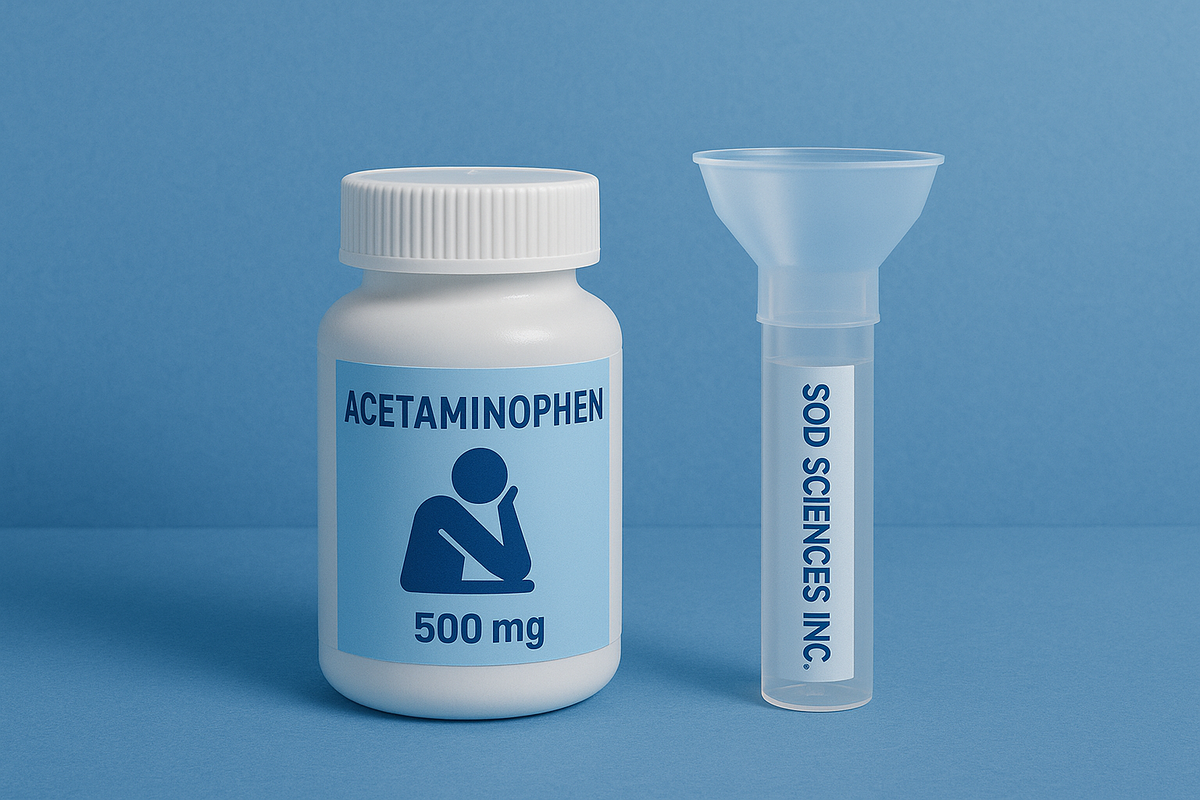For At Least 5–10% of the U.S. Population, RFK Jr. Is Right: Acetaminophen Can Cause Autism

Acetaminophen, America’s go-to pain and fever reducer, is not as safe as the public has been led to believe. For decades, doctors have handed it out freely, even to pregnant women, calling it the “safe choice.” But new genetic and biochemical evidence shows that for millions of mothers and their children, this drug may in fact be one of the hidden drivers of the autism epidemic.
When Robert F. Kennedy Jr. stated that acetaminophen can cause autism, he was criticized for overstating the case. But the science now shows he was correct, at least for 5–10% of the U.S. population. These are individuals carrying specific genetic variants that make them uniquely vulnerable to oxidative stress and glutathione depletion, the exact mechanisms triggered by acetaminophen.
Low-cost, oral saliva-based tests offer a potential solution. SOD Sciences, an emerging precision medicine startup has a patent-pending saliva-based antioxidant test, which can identify at-risk women before pregnancy or in its earliest stages among other things. By combining diagnostics with proven antioxidant interventions, SOD Sciences offers a direct path to prevention, turning a controversial debate into an actionable solution.
Conflicting Science: Evidence for and Against
Multiple observational studies have suggested a troubling association between acetaminophen use in pregnancy and neurodevelopmental disorders. A Johns Hopkins study in 2019, using umbilical cord blood biomarkers, found that newborns with the highest exposure levels were three times more likely to develop ADHD or autism. A 2025 meta-analysis encompassing more than 100,000 pregnancies reached a similar conclusion, strengthening the case that something real is happening.
But science rarely moves in a straight line. In April 2024, the largest epidemiological study to date, 2.48 million Swedish births, reported no causal relationship. By comparing siblings, the researchers effectively controlled for genetic and environmental confounders. Their conclusion was stark: acetaminophen itself may not be the culprit.
Here lies the heart of the controversy. On one side, biomarker-based and meta-analytic evidence suggests increased risk. On the other, the largest population study dismisses causality. Both cannot be right.
The Genetic Trap: Millions of Women at Risk
The danger is not uniform across the population. About 24% of women of childbearing age carry at least one T allele of the SOD2 rs4880 SNP and the T allele of the GPX1 rs1050450 SNP. That is roughly 15–16 million American women.
Each year there are approximately five million pregnancies in the United States. By simple math, between one and two million women annually are likely entering pregnancy with very low glutathione reserves. Add the oxidative burden of acetaminophen, which generates reactive oxygen species (ROS) and depletes glutathione, and the result can be devastating for the developing fetus. Children born under these conditions may start life with depleted antioxidant defenses, a well-established driver of autism spectrum disorders.
The Science Is Not “Early,” It Is Proven
Some will say this is speculative. That is wrong. The science is not early. Covid provided researchers with hundreds of millions of blood samples, which have since been analyzed globally. These datasets confirm the role of oxidative stress, genetic vulnerability, and glutathione depletion in a wide range of chronic diseases, including autism. The association between acetaminophen use during pregnancy, oxidative stress pathways, and neurodevelopmental harm is not theoretical. It is demonstrated, tested, and validated across massive sample sizes.
Oxidative Stress, Autism, and the Acetaminophen Connection
The biology is straightforward. Acetaminophen is metabolized safely when sulfation and glucuronidation pathways are available. But once those are saturated, the body produces a toxic byproduct called NAPQI. Under normal circumstances, glutathione neutralizes NAPQI. Pregnancy, however, is already a state of heightened oxidative stress. Glutathione levels are lower, reactive oxygen species are higher, and the addition of acetaminophen tips the scale further.
For women carrying SOD2 or GPX1 polymorphisms, the antioxidant system is already compromised. Superoxide dismutase and glutathione peroxidase, the enzymes needed to neutralize free radicals, simply do not function efficiently. When acetaminophen depletes what little glutathione remains, the developing brain is left exposed. The result can be permanent neurodevelopmental damage.
Solutions Exist: SOD Sciences Leads the Way
The good news is that this risk can be identified and prevented. SOD Sciences Inc. has developed patent-pending, low-cost, saliva-based antioxidant tests that directly measure genetic vulnerabilities and glutathione levels. These tests can identify which women are most at risk before and during pregnancy. They are non-invasive, inexpensive, and scalable for mass use.
Armed with this knowledge, women can make informed choices about acetaminophen use. Even more importantly, they can adopt protective strategies to restore antioxidant capacity. Solutions such as Fibersol-2 and tagatose are not “experimental” — there is vast data supporting their ability to activate the Nrf2 pathway, boost glutathione synthesis, and stabilize redox balance. These compounds also serve as prebiotics, enhancing gut microbiota that produce butyrate, which directly supports antioxidant enzyme activity.
The Bigger Picture: From Risk to Prevention
The acetaminophen–autism controversy is more than a debate about a household drug. It is a test case for the future of medicine. Population averages may suggest safety, but precision medicine reveals subgroups for whom the risks are dramatic. Millions of women are entering pregnancy without adequate antioxidant defenses, and a drug once thought safe may be pushing their children into lifelong disability.
The solution is clear: direct-to-consumer saliva tests from SOD Sciences that identify vulnerable patients, paired with targeted antioxidant interventions. This is how we prevent unnecessary autism cases. This is how we move from reactive medicine to proactive prevention.
The key takeaway is simple. For most, acetaminophen may still be safe. But for millions of women carrying the wrong genes, it is dangerous. The world can no longer ignore this reality. Science has proven the risk. The technology to identify it exists. And the solutions are ready.





